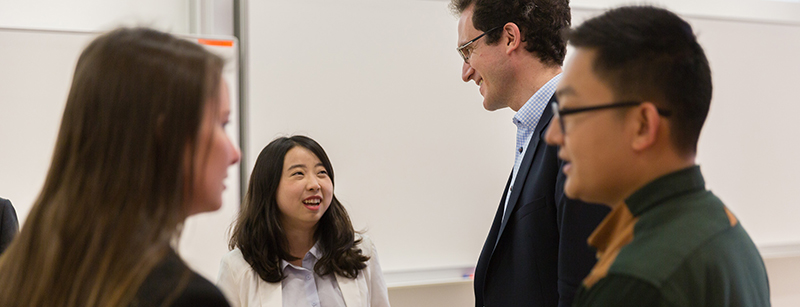About 100 years ago, Vienna was the world’s intellectual centre, a cultural and scientific hotspot where disruptive ideas were developed that dominated the entire 20th century. In Vienna, the sociologist Max Weber debated with the young economist Joseph Schumpeter, Sigmund Freud invented psychoanalysis, and Arnold Schönebergrevolutionised composition. Today, Que Linyao, a China-EU School of Law student, is also discovering the Austrian capital as an experimental lab for new ideas. Or, to be more precise, the Vienna University of Economics and Business.
"I think that it is very important for every student to go abroad,” the 23-year-old explains as she packs her bag for her next class in her student apartment in the Donaustadt district, which is within walking distance to the Danube River and the United Nations Office. Speaking about new perspectives and imagining what they would be like is not enough, she argues. “You have to experience different lifestyles to be able to decide which one you like.” Que Linyao, with long, black hair, a white blazer and cropped boyfriend jeans, is an outstanding law student. In the 2017 Vis East Moot, one of the most renowned student competitions in business law worldwide, she was honoured as the second best individual speaker in the pre-moots.
For six weeks, she is attending two international tax law courses in the Business Law LL.M. programme at the Vienna University of Economics and Business. Que Linyao studied Chinese tax law in Beijing before, but this is the first time she is covering EU and international tax law. She is convinced that for law students, analysing other legal systems is essential. “What you learn can help you critically analyse your own legal system and further develop it,” she asserts.

Que Linyao is one of 90 Chinese students from the China-EU School of Law spending up to two months at a partner and associate universities in Europe. The China-EU School of Law has offered this opportunity since 2014 as part of the Master of European and International Law’s elective module. This year, students attend courses in Hamburg, Maastricht, Budapest, Lund, Strasbourg, Madrid – or Vienna. “The students not only get an impression of a European law school, most of all, they benefit academically from new legal perspectives and teaching methods and from perfecting their English”, says Harald Eberhard, Professor for Public Law and China-EU School of Law coordinator at Vienna University of Economics and Business.
With this focus on course topics in an exchange programme, the China-EU School of Law is matching a trend. Content of degrees is the main motivation for young Chinese to study abroad, a study by the Berlin Mercator Institute for China Studies revealed. In general, in recent years the stream of Chinese students flowing to Western countries has rapidly increased. According to the Chinese Ministry of Education, in 2016, about 544,000 Chinese left their home country to pursue studies abroad, more than three times as many as in 2008.
To Que Linyao, bright days are the most visible indication that she is not in China at the moment, she says. In Beijing in May, the sun sets around 7.30 p.m., whereas in Vienna it does not get dark until at least one hour later. “I like very much that the days feel much longer here,” Que Linyao adds.
Student life in a foreign country, on the other hand, can be very challenging. Que Linyao experiences that there is “a big difference” between the Chinese lecture-oriented teaching style and the Austrian discussion-oriented style. “In our Tax Treaty Law class, Professor Rust often asks questions and students actively answer,” she explains. “Sometimes he also randomly calls on a student to answer a question.” Her heart was pounding when he called on her the first time. However, she recalls managing to answer it correctly.
In the same course, also for the first time, she used clickers: small devices like a remote control, quite similar to the ones quiz show audiences use on TV. With this technique, Prof. Rust finds out whether all students understood the lecture. He asks multiple choice or yes-no questions, and students get a few minutes to think about their answers before they decide by pressing a button. A radio-frequency signal then transmits the students’ answers to the professor, and a software programme on his computer produces a bar chart in real time showing the students’ answers. If too many students get it wrong, Prof. Rust explains the concept in another way again.
To Que Linyao, the most interesting thing about legal studies still is comparing law. “In my first semester I thought that law works like mathematics, where each problem has one exact answer.” With this approach, she found it difficult to solve her first cases as the law did not describe every detail of how to solve a legal problem, even though Chinese Law is a civil legal system that is based on codified general principles as opposed to common law, such as in the US legal system, where courts rule by looking to precedents. “Today, though, I am aware that law in both China and Europe was shaped by many theories and scholars to become what it is today.” With new developments in society, she believes the legal system also constantly evolves. “The law is always being developed, and that is what makes it exciting.”
